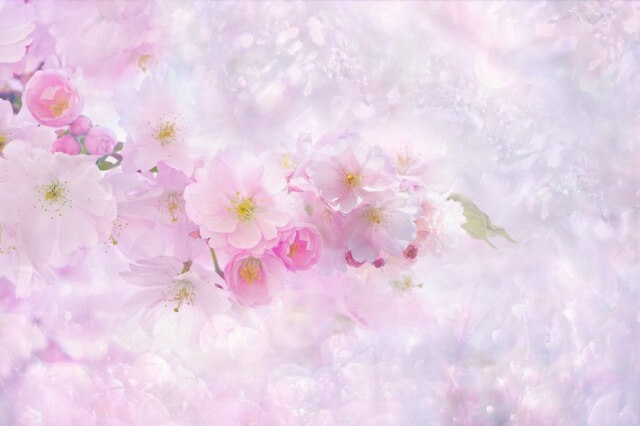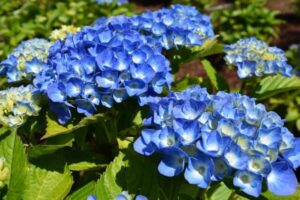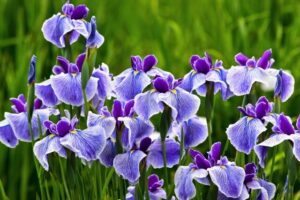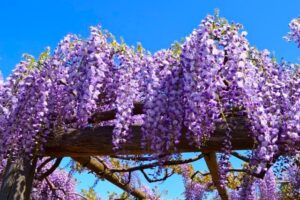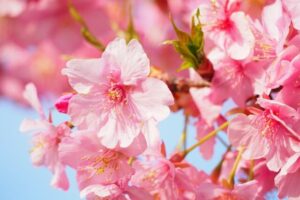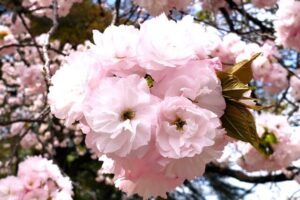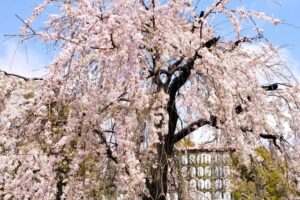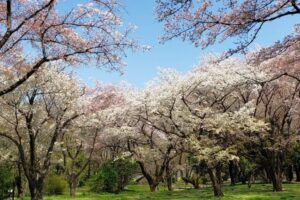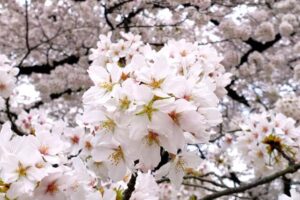外国人から「花見って何ですか?」と聞かれたら、英語で答えられますでしょうか?
 woman
woman(「花見」って何ですか?)



花見って英語で何て説明すればいいのかしら?
外国人に花見をどうやって説明すればいいのか?
そんな疑問にお答えします。
花見は英語で「Cherry-blossom viewing(桜の花を見ること)」です。



花見について英語で説明する例文を一緒に見て行きましょう。
花見を英語で説明
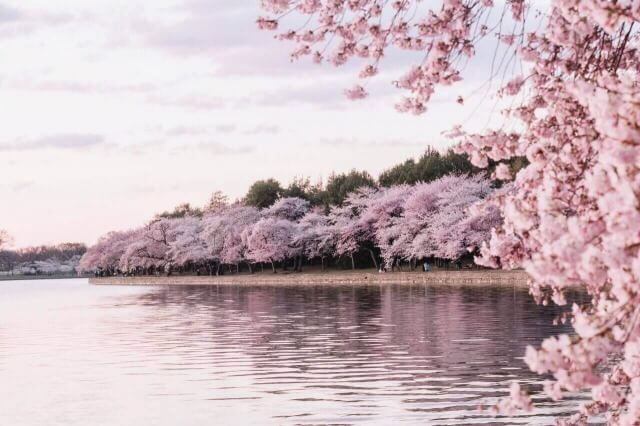

Hanami is a traditional Japanese custom to enjoy the beauty of cherry blossoms.
花見は、桜の美しさを楽しむ日本の伝統的な習慣です。
- Hanami/花見
- traditional/伝統的な
- Japanese/日本の
- custom/習慣
- enjoy/楽しむ
- beauty/美しさ
- cherry/桜
- blossom/花
Cherry blossoms are in full bloom all over the country from late March to early May.
3月下旬から5月上旬にかけて、全国に桜が咲き誇ります。
- Cherry blossoms/桜
- be in full bloom/満開になる
- all over the country/全国
- late/下旬
- March/3月
- early/上旬
- May/5月
The period when the flowers are in bloom is about 1 to 2 weeks after flowering, and the appearance of the cherry blossoms falling all at once is called “blizzard of falling cherry blossoms”.
花が咲いている期間は開花から1~2週間程度で、桜が一斉に散る様子は「桜吹雪」と呼ばれています。
- period/期間
- flower/花
- be in bloom/咲いている
- about/およそ
- week/週
- after/後
- flowering/花の咲いている
- appearance/様子
- cherry blossoms/桜
- fall/散る
- all at once/一斉に
- call/呼ぶ
- blizzard/吹雪
The “Sakura Front”, which represents the forecast of cherry blossoms, is announced annually by the Meteorological Bureau.
桜の開花予想を表す「さくら前線」は、気象庁から毎年発表されます。
- Sakura Front/さくら前線
- represent/表す
- forecast/予想
- cherry blossoms/桜
- announce/発表する
- annually/毎年
- Meteorological Bureau/気象庁
Those who are planning to see the cherry blossoms will check the “Sakura Front” and decide the date of the cherry blossom viewing.
花見を予定している人は「さくら前線」を確認し、花見の日程を決めます。
- those who/~する人々
- plan/予定する
- see/見る
- cherry blossoms/桜
- check/確認する
- Sakura Front/桜前線
- decide/決める
- date/日程
- cherry blossom viewing/花見



(桜は吹雪のように散るのね。)
花見の季節を英語で説明
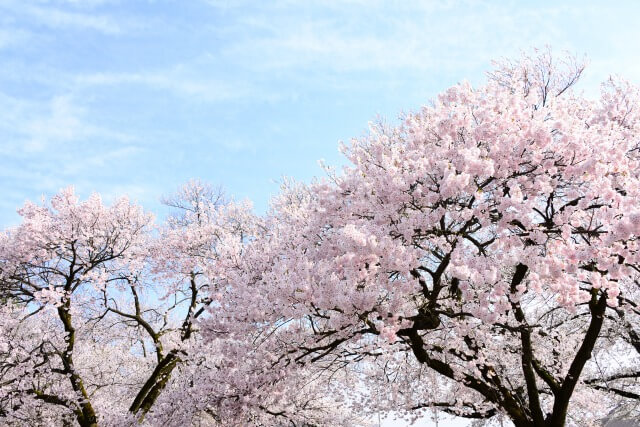

The cherry-blossom viewing season varies from region to region.
花見の季節は地方毎に異なっています。
- cherry-blossom viewing/花見
- season/季節
- vary from/異なる
- from region to region/地域ごとに
The cherry-blossom viewing season is from March to April in Tokyo and Osaka, from early to mid-May in Hokkaido, and from January to February in Okinawa.
花見の時期は、東京や大阪は3月~4月、北海道では5月上旬から中旬、沖縄では1月~2月になっています。
- cherry-blossom viewing/花見
- season/時期
- from A to B/AからB
- March/3月
- April/4月
- Tokyo/東京
- Osaka/大阪
- early/上旬
- mid/中旬
- May/5月
- Hokkaido/北海道
- January/1月
- February/2月
- Okinawa/沖縄



(桜の季節は地域ごとに随分と違うのね。)
花見の歴史を英語で説明
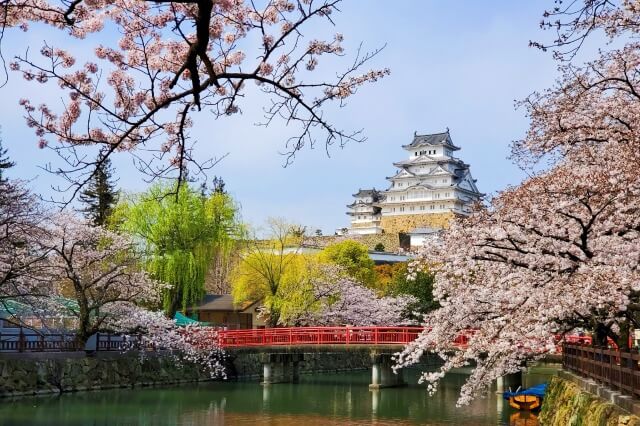

It is said that cherry blossom viewing was started by aristocrats in the Nara period, and at that time, flowers meant plum blossoms.
花見は奈良時代に貴族が始めたと言われており、当時花と言えば梅の事を意味していました。
- it is said that/と言われている
- cherry blossom viewing/花見
- start/始まる
- aristocrat/貴族
- Nara period/奈良時代
- at that time/その時
- flower/花
- meant/mean(意味する)の過去形・過去分詞
- plum/梅
- blossom/花
In the Heian period, flowers came to mean cherry blossoms.
平安時代には、花と言えば桜を意味するようになってきました。
- Heian period/平安時代
- flower/花
- come to/~するようになる
- mean/意味する
- cherry/桜
- blossom/花
Farmers were watching the cherry blossoms as a flower to signal spring, the time of rice planting.
農民たちは、田植えの時期である春を知らせる花として桜を鑑賞していました。
- farmer/農民
- watch/見る
- cherry/桜
- blossom/花
- as/として
- signal/知らせる
- spring/春
- time/時期
- rice planting/田植え
In the Kamakura period, samurai and tradesmen began to enjoy cherry blossom viewing, and cherry blossoms began to be planted in temples and other places.
鎌倉時代になると、武士や商人も花見を楽しむようになり、寺院などにも桜が植えられるようになりました。
- Kamakura period/鎌倉時代
- samurai/侍
- tradesman/商人
- began/begin(始める)の過去形
- enjoy/楽しむ
- cherry blossom viewing/始める
- cherry blossom/桜
- plant/植える
- temple/寺院
- other/他の
- place/場所
In the Edo period, cherry-blossom viewing became popular as a pleasure for the common people.
江戸時代になると、花見は庶民の楽しみとしても浸透していきました。
- Edo period/江戸時代
- cherry-blossom viewing/花見
- became/
- popular/人気
- as/として
- pleasure/楽しみ
- common people/庶民
After the Meiji era, many cherry blossoms were burned due to the effects of the war, but after that, the cherry blossoms spread all over the country, and it became possible to see cherry blossoms all over the country as it is now.
明治時代以降には、戦争の影響で多くの桜は燃やされてしまいましたが、その後、全国に桜は広まり、今のように全国で花見ができるようになっていきました。
- Meiji era/明治時代
- cherry blossom/桜
- burn/燃やす
- due to/のため
- effect/影響
- war/戦争
- after that/その後
- spread/広まる
- all over the country/全国
- became/become(なる)の過去形
- possible/できる
- see/見る
- as/のように
- now/今



(花見は随分と昔に始まったのですね。)
花見で開かれる宴会を英語で説明
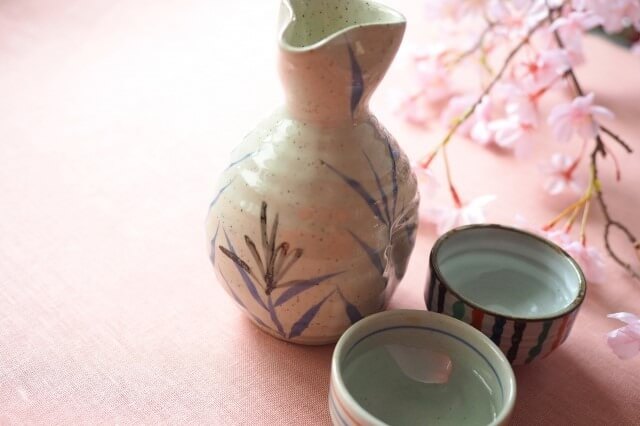

In addition to seeing the cherry blossoms, many people gather under the cherry blossom trees to eat cherry-blossom viewing lunch boxes and drink alcohol.
桜を見るだけでなく、大勢の人が桜の木の下に集まり、花見弁当を食べたりお酒を飲んだりします。
- in addition to/~に加えて
- see/見る
- cherry blossom/桜
- gather/集まる
- under/下
- tree/木
- eat/食べる
- cherry-blossom viewing lunch boxe/花見弁当
- drink/飲む
- alcohol/お酒
The banquet while watching the cherry blossoms in full bloom is tasteful and fun.
満開の桜を見ながらの宴会は、風情があり楽しいものです。
- banquet/宴会
- while/ながら
- watch/見る
- cherry blossom/桜
- in full bloom/満開
- tasteful/風流な
- fun/楽しい
These banquets can last until late at night, but they can also be a fuss and a problem.
これらの宴会は夜遅くまで続くこともありますが、大騒ぎを起こして問題になることもあります。
- banquet/宴会
- last/続く
- until/まで
- late/遅く
- night/夜
- also/もまた
- fuss/騒ぎ
- problem/問題
In addition, many people leave the garbage from the banquet and go home, which may spoil the beautiful scenery of the cherry blossoms.
また、宴会で出たごみを放置して帰る人も多く、美しい桜の景観を損なうこともあります。
- in addition/その上
- leave/残す
- garbage/ごみ
- banquet/宴会
- go home/家に帰る
- spoil/台無しにする
- beautiful/美しい
- scenery/景観
- cherry blossom/桜



(桜を見ながらの宴会は風情がありますね。)
夜の花見・夜桜を英語で説明
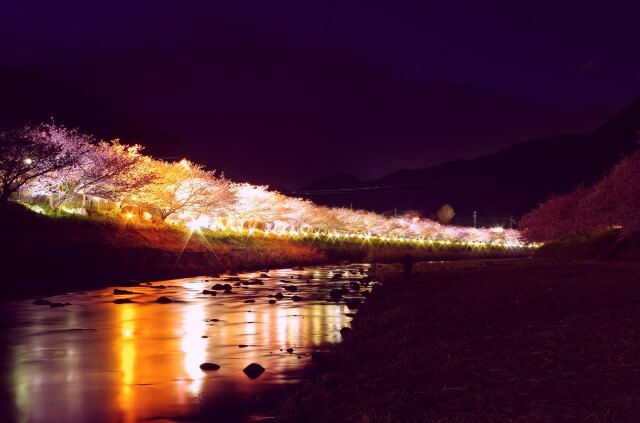

Cherry-blossom viewing at night is called “Yozakura”.
夜に花見をすることを、「夜桜」と言います。
- Cherry-blossom viewing/花見
- night/夜
- call/呼ぶ
- Yozakura/夜桜
Many cherry blossom viewing spots illuminate the cherry blossoms at night so that you can enjoy the “Yozakura”.
「夜桜」を楽しめるように、多くの桜の名所では夜に桜をライトで照らします。
- cherry blossom viewing/花見
- spot/場所
- illuminate/ライトで照らす
- cherry blossom/桜
- night/夜
- so that/するために
- enjoy/楽しむ
- Yozakura/夜桜
The cherry blossoms illuminated by the lights have a fantastic beauty that is different from the cherry blossoms in the daytime.
ライトで照らされた桜には、昼間とは違った幻想的な美しさがあります。
- cherry blossom/桜
- illuminate/照らす
- light/ライト
- fantastic/幻想的な
- beauty/美しさ
- different/違う
- daytime/昼間



花見団子を英語で説明
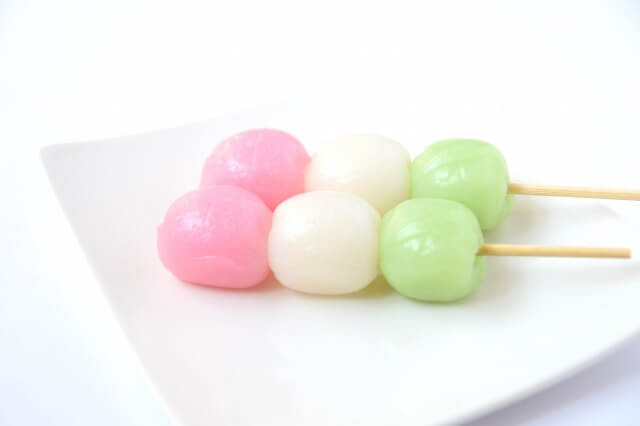

Hanami dumplings are often eaten at cherry blossom viewing.
花見では花見団子が良く食べられます。
- Hanami dumpling/花見団子
- eaten/eat(食べる)の過去分詞
- cherry blossom viewing/花見
Hanami dumplings have been eaten by the common people since the Edo period during cherry blossom viewing.
花見団子は、江戸時代から花見の時に庶民に食べられてきました。
- Hanami dumpling/花見団子
- eaten/eat(食べる)の過去分詞
- common people/庶民
- since/~から
- Edo period/江戸時代
- during/の間
- cherry blossom viewing/花見
Hanami dumplings are made up of three colors: pink, white, and green.
花見団子は、桃色・白・緑の3色のお団子からできています。
- Hanami dumpling/花見団子
- be made up of/~からなる
- three/3
- color/色
- pink/桃色
- white/白
- green/緑
Pink is cherry blossoms for spring, white is snow for winter remnants, and green is mugwort for summer.
桃色は桜で春を、白は雪で冬の名残を、緑はヨモギで夏を表現しています。
- pink/桃色
- cherry blossom/桜
- spring/春
- white/白
- snow/雪
- winter/冬
- remnant/面影
- green/緑
- mugwort/ヨモギ
- summer/夏



(綺麗なお団子ね。)
海外の花見を英語で説明
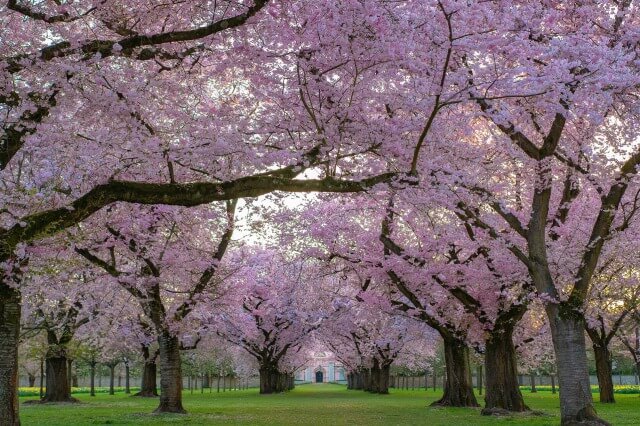

Cherry-blossom viewing is also very popular in the United States.
アメリカでも、花見は非常に人気があります。
- Cherry-blossom viewing/花見
- also/もまた
- popular/人気がある
- the United States/アメリカ合衆国
In 1912, Japan presented the United States with 3,000 cherry trees as a gift to celebrate national friendship.
1912年、日本は米国に国家の友情を祝う贈り物として3,000本の桜の木を贈りました。
- Japan/日本
- present/贈る
- the United States/アメリカ合衆国
- cherry/桜
- tree/木
- as/として
- gift/贈り物
- celebrate/祝う
- national/国家の
- friendship/友情
These trees were planted in Washington, D.C., and in 1965 an additional 3,800 trees were donated.
これらの木はワシントンD.C.に植えられ、1965年には更に3,800本の木が寄付されました。
- tree/木
- plant/植える
- Washington, D.C./ワシントンD.C.
- additional/追加の
- donate/寄付する
These cherry trees are still a popular tourist attraction, and the National Cherry Blossom Festival is held every spring when they bloom.
これらの桜の木は今も人気の観光名所であり、毎年春に開花すると全国桜まつりが開催されます。
- cherry tree/桜の木
- still/まだ
- popular/人気の
- tourist attraction/観光名所
- National Cherry Blossom Festival/全国桜まつり
- held/hold(開催する)の過去形・過去分詞
- every/毎
- spring/春
- bloom/開花する



(アメリカの桜は日本からのプレゼントなのね。)
花見を英語で説明|まとめ
いかがでしたでしょうか?
花見について、外国人の友人にうまく伝えられそうでしょうか?
日本には桜の名所がたくさんあり、満開の桜は本当に綺麗ですね。
日本に住んでる外国人の友人がいたら、桜の開花予報を確認し、是非ともお花見に連れて行ってあげてください。
ただ、海外から日本のお花見を見に来たいという人については注意が必要です。
花見の時期は気候によってかなり変動してしまいます。
せっかく花を見ようと思って日本に来ても、まだ花が咲いてなかったり、花が散ってしまった後だとがっかりさせてしまいますね。
花見の時期は一週間ぐらいで非常に短いということも、きちんと伝えておきましょう。





